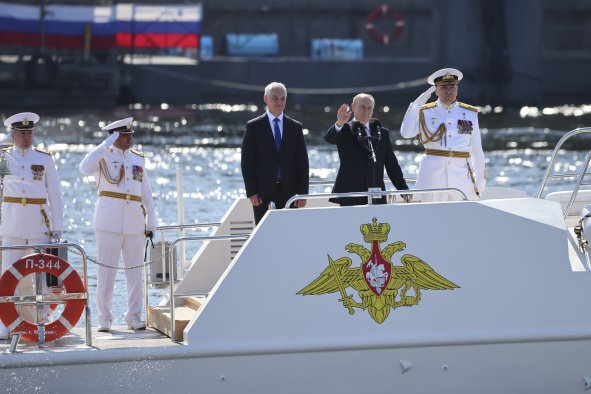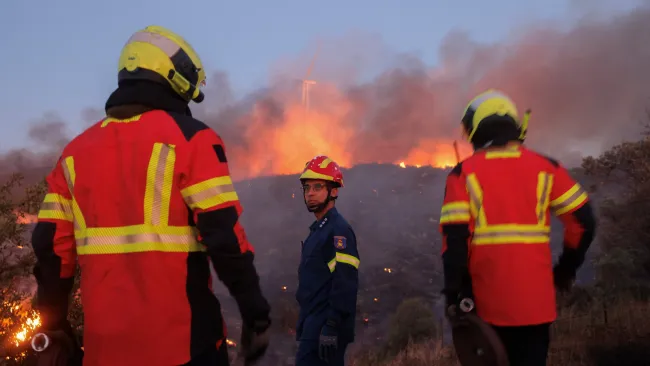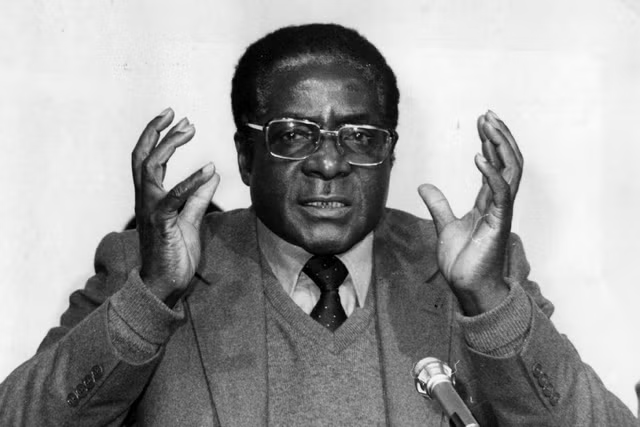A host on Russian state TV has floated a conspiracy theory that the Kremlin is working with former President Donald Trump in preparation for his potential victory in the 2024 election.
The unsubstantiated allegation was presented by Ivan Kamenev, a host on the Solovyov live show, an excerpt of which was posted on X, formerly Twitter, on Tuesday by Julia Davis, the founder of the Russia Media Monitor watchdog group.
"Igor Pshenichnikov, an expert at the Russian Institute for Strategic Studies, says the rumor that Russia's Foreign Ministry is working with Trump is most likely true," Davis wrote.
In the clip, Kamenev mentioned Trump's election bid: "Here's what I want to ask. There was news, although it wasn't officially confirmed, that Russia's Foreign Ministry is working on a big deal for negotiations with Donald Trump."
Responding to Kamenev's suggestion, Igor Pshenichnikov, an expert at the Russian Institute for Strategic Studies, said, "It would be logical to suppose that our Foreign Ministry is working with Trump's team."
Newsweek was unable to find any specific reports in Russia on Kamenev's claims that Russia's Foreign Ministry is working on a deal for negotiations with Trump. Russia has often sought to sow distrust and division via TV messaging. We have contacted Russia's Foreign Ministry and Trump's campaign for comment by email.
Trump, the Republican presidential nominee for the 2024 election, has said repeatedly that if reelected, he would swiftly bring an end to the war in Ukraine by speaking with Russian President Vladimir Putin.
On July 4, the Kremlin denied that talks were underway between Putin and Trump on possible conditions for peace in the Russia-Ukraine war.
In the video, Pshenichnikov said of Trump: "Seeing in him, just as the rest of the world does, the most likely winner in the election. If no one gets in his way, and if there's even an election, if there is an election and if it's honest, if Trump lives until November 5, then he will certainly win."
The expert added: "It would be stupid for us not to be working on potential dialogue with Trump. I think these leaks have a basis."
The U.S. presidential election, where Trump is likely to face off against Vice President Kamala Harris, the presumptive Democratic nominee, is scheduled for November 5.
On Monday, a U.S. intelligence official told reporters on a call held by the Foreign Malign Influence Center—an agency that operates under the Office of the Director of National Intelligence—that the U.S. intelligence community believes the Kremlin will focus its propaganda efforts on backing Trump over Harris in the election, NBC News reported.
"Russia's core interest in this election is opposing candidates who want to offer further aid to Kyiv, and we expect Russia's focus will remain on that," the official said.
Earlier this year, Hungarian Prime Minister Viktor Orbán said Trump told him he would pause U.S. military aid to Ukraine to end the war.
Responding to those claims, Steven Cheung, the Trump campaign communications director, said in a statement in March that Trump "believes European nations should be paying more of the cost of the conflict, as the U.S. has paid significantly more, which is not fair to our taxpayers."
Russia "remains the predominant threat to U.S. elections," the Foreign Malign Influence Center said in an election security update on Monday.
"Moscow continues to use a broad stable of influence actors and tactics and is working to better hide its hand, enhance its reach, and create content that resonates more with U.S. audiences," it continued.
The agency added, "Russian influence actors have undertaken distinct efforts during this election cycle to build and use networks of U.S. and other Western personalities to create and disseminate Russian-friendly narratives."
Do you have a tip on a world news story that Newsweek should be covering? Do you have a question about the Russia-Ukraine war? Let us know via worldnews@newsweek.com.
Disclaimer: The copyright of this article belongs to the original author. Reposting this article is solely for the purpose of information dissemination and does not constitute any investment advice. If there is any infringement, please contact us immediately. We will make corrections or deletions as necessary. Thank you.



